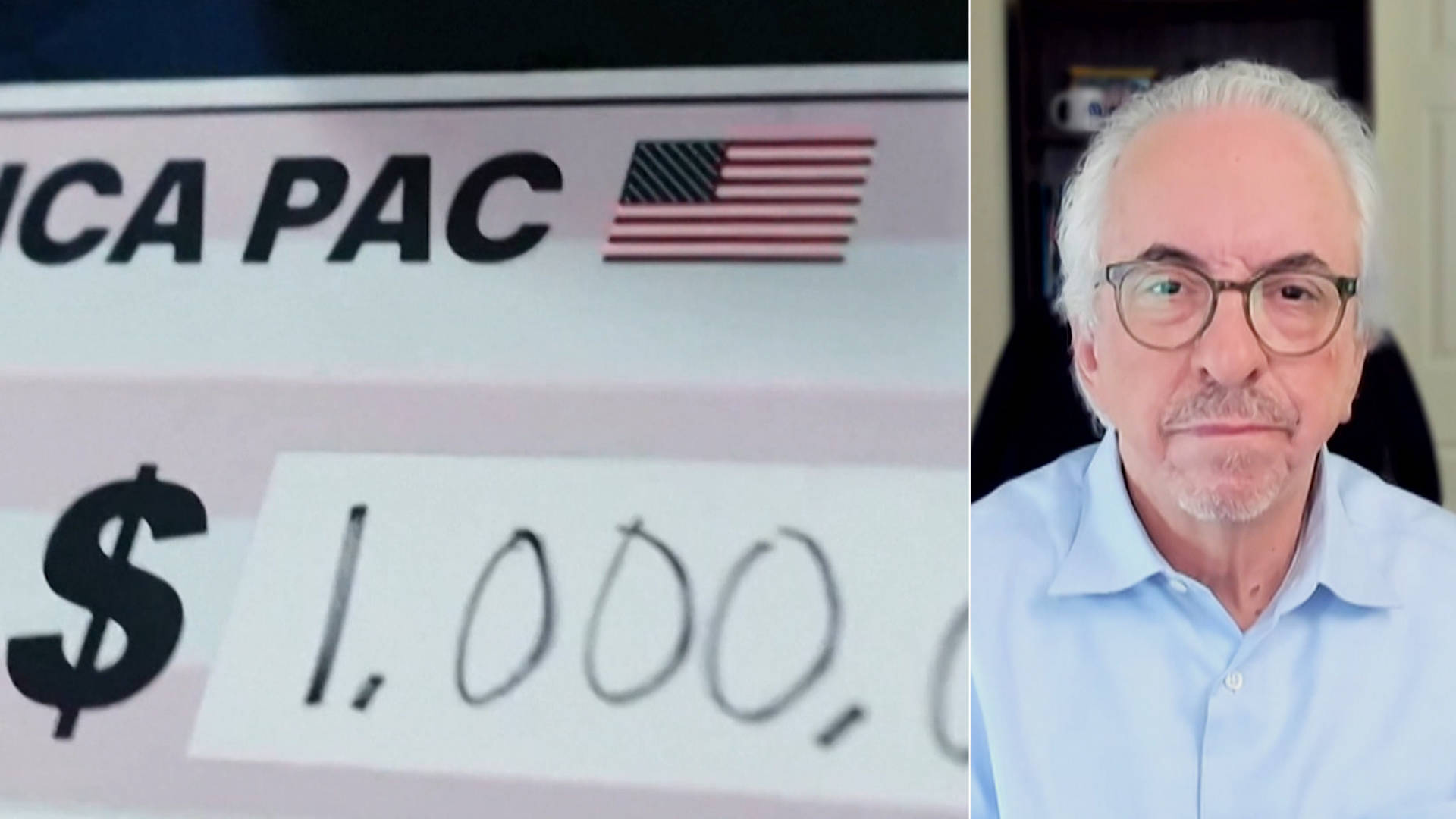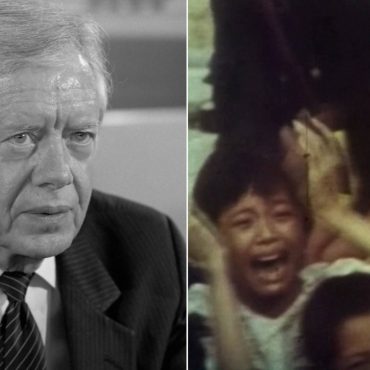This is a rush transcript. Copy may not be in its final form.
AMY GOODMAN: I wanted to bring Larry Noble into this conversation, former general counsel of the Federal Elections Commission. If you can start off by talking about the role of the FEC and what you are most concerned about right now?
LARRY NOBLE: The FEC was intended to be the civil enforcement agency for the federal campaign finance laws. It was created in the wake of Watergate. And the idea here was that we have contribution limits, we have limits on what the parties can do. All of it was to control the influence of money in politics.
But the FEC over the years has really become more of a roadblock to real campaign finance enforcement than the enforcer. And what we saw is it went through various phases, where it was active at one point — it’s three Republicans, three Democrats — and then it became more partisan, where the Republicans became less willing to go after Republicans, and the Democrats still generally vote for enforcement against Republicans and Democrats. And then it went through a stage where it became more ideological, which was — which really means that the Republicans no longer vote for enforcement against Democrats or Republicans, and they just don’t agree with the law, and so they’re sitting on a commission where they don’t agree with enforcing the law. And now we have a Democrat who has been voting more with the Republicans. So we have an agency that’s supposed to be enforcing the campaign finance laws but is not doing it. And it’s opening up more loopholes as they go along.
And in that context, what really worries me is that we have an election system, and that therefore means a government, which very much favors those with a lot of wealth. Those with a lot of wealth have the ability to influence elections the way that the rest of us don’t. And I think it’s critically important — and I really appreciate the work that Neil is doing, and I think what he talked about was very important. But part of my feeling now is, while we have to fight to make sure everybody has the right to vote and everybody who has the right to vote is able to exercise that vote, we have a problem that once candidates are in office, they tend to follow and do what their wealthiest supporters wanted them to do. And we had a system, and we still technically have a legal system, that is supposed to keep all of these super PACs and spending of all of these hundreds of millions of dollars by individuals, keep them away from the campaigns and not have them coordinate in any way with the campaigns. And that’s just not what’s happening.
So I’m concerned about the election administration, and I’m concerned about what happens also because of all the money in politics and how it’s basically silencing the voter. The right to vote is sacrosanct. You have to be able to vote if you’re eligible to vote. But your vote should mean something later in governance. It should not just then be drowned out by the money that the wealthy and people like Elon Musk are spending.
AMY GOODMAN: And what about what Elon Musk is spending? Yes, the Justice Department sent a letter, but it’s the local DA in Pennsylvania, in Philadelphia, who sued. Why isn’t this illegal, giving money to people to vote, $1 million a day?
LARRY NOBLE: I think it is illegal, and there are a lot of election law experts who think it’s illegal. There’s a federal law against paying somebody to register or urging them to register. And what this is doing is urging people to register by saying that if you’re registered in these specific swing states, then you’ll be eligible for this lottery. So, it really, in my view, violates potentially two laws: one, federal law about not paying people to register or to urge them to register, and then state lottery laws. And, you know, when I was in private practice, this is something we used to have to advise people. You’re not only concerned about the federal campaign finance laws; you also have to be concerned about state lottery laws in these type of situations.
So I think he is violating the law. But I think what Musk has shown at this point is that it’s not likely he cares about that very much. He’s just going to keep going ahead. And I think the bet they’re placing is that if they can win, or if they can after the election throw up enough objections and get their people rallied and somehow take over, that all of this goes away. They don’t have to worry about it anymore.
AMY GOODMAN: Can you talk about Citizens United? Also, what happened to the McCain-Feingold — that was Senator McCain, now deceased, and Senator Feingold of Wisconsin — of, what, 20 years ago, 2002?
LARRY NOBLE: Right. So, what happened was that after the Federal Election Campaign Act was first enacted and the FEC came into existence in 1976, there were more and more loopholes added by the FEC, the Federal Election Commission, to the law and in the courts, where we ended up with a system that was not working the way it was intended to work. The political parties were getting what’s called soft money, all this money that’s not legal under the federal limits and prohibitions. And they were saying they were using it for state elections, but they were really using it for federal elections.
McCain-Feingold was supposed to put an end to that. And what it basically said was the party committees can only accept money under the federal laws. It put restrictions on federal candidates and officeholders being able to solicit money. They can only solicit money under the federal limits and prohibitions. And it had a number of other provisions. It was really a very strong law.
It was immediately challenged in court by Senator McConnell and others. And most of the law was upheld by the Supreme Court. And the Supreme Court talked about the importance of having laws that not only get at bribery and quid pro quo type of transactions, where you pay somebody directly to do something, but also to get at the large contributions and the appearance of influence and buying access. And they said that undermined democracy.
Well, then you moved ahead to 2010, and you had the Citizens United case. The important thing to know about that is that the makeup of the Supreme Court had changed. Sandra Day O’Connor had retired and was replaced. So, we’re now looking at a new Supreme Court. And Citizens United, for the first time, the Supreme Court said the corporations and labor unions can make unlimited, what are called independent expenditures, meaning that they can use their corporate money and spend as much of it as they want on ads for candidates, etc., as long as it’s independent.
What was really concerning about that case, besides the ruling, was the court now said that really what we have to look at is quid pro quo corruption, corruption that is basically bribery, paying somebody. And it undermined what the Supreme Court had earlier said about the importance of dealing with the appearance of corruption that large contributions bring. And the Supreme Court said, in the Citizens United case and cases that followed it — said that buying influence and access is not really a problem, it is a feature of democracy, and you expect officeholders to be more responsive to the people who contribute to them. And that, again, undermines, in my view, the very concept of democracy, where everybody has the same voice and has the ability to be heard. And you don’t have that when you’re in a situation where the wealthy can just drown out everybody else. And then, once the election is over, they’re in office, they get greater access to candidates, and they have much stronger influence with candidates. So, we’re now in a situation —
AMY GOODMAN: Larry —
LARRY NOBLE: Go ahead. I’m sorry.
AMY GOODMAN: We just have just 20 seconds.
LARRY NOBLE: I’ll just say, very quickly, what they’ve also undermined completely is the idea of independence of these groups. Elon Musk is supposed to be totally independent of Trump, if he’s going to spend this money. That’s the only reason they allowed it. But instead, we see him at the rallies, and one has a strong suspicion that they are sharing information that will help Musk help Trump.
AMY GOODMAN: Larry Noble, former general counsel of the Federal Election Commission, now teaches at American University Washington College of Law. And Neil Makhija, Montgomery [County] commissioner and chair of the board of elections in Montgomery County, Pennsylvania. You can check out his video essay at democracynow.org and The New York Times.
When we come back, we go to Gaza. We’ll speak with Save the Children. Stay with us.











Post comments (0)